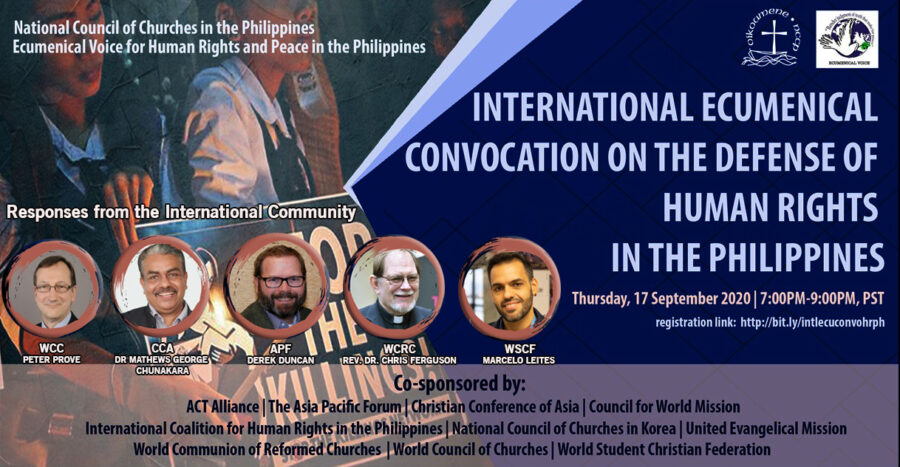International Convocation affirms defence of human rights in the Philippines

An international convocation held on 17 September 2020 to defend the struggle against the ongoing violations of human rights reiterated commitments to intensify its accompaniment of and solidarity with the Filipino people and called on churches and ecumenical organisations as well as all people of goodwill within and outside the Philippines to do the same.
Organised by the National Council of Churches in the Philippines (NCCP) and Ecumenical Voice for Human Rights and Peace in the Philippines, the international convocation was sponsored by the Asia Pacific Forum, the Christian Conference of Asia, the Council for World Mission, the International Coalition for Human Rights in the Philippines, the National Council of Churches in Korea, the United Evangelical Mission, the World Communion of Reformed Churches, the World Council of Churches, and the World Student Christian Federation.
The panellists who shared experiences of the military, police, and paramilitary forces’ manoeuvres to repress the Filipino people highlighted the gross and systematic violation of human rights. They highlighted the intimidation through trumped-up charges levelled against the political opposition, people’s organisations, journalists, social workers, peace advocates, human rights defenders, and all those who are critical of the government and military, including church workers, pastors, bishops, and students.
The online convocation, attended by a large representative group of ecumenical and ecclesiastical bodies across the world, listened to the traumatic experiences of the Filipino people even amidst the COVID-19 pandemic quarantines in the country. Several instances of the “red-tagging” of activists, including church people and churches; numerous instances of attacks on indigenous communities and their schools; closure of a major media outfit; and threats to workers' humanitarian aid groups and agencies were shared during the convocation.
While expressing the solidarity of the Asian churches and the Asian ecumenical movement with the Filipinos who were trying to defend their human rights, the General Secretary of the Christian Conference of Asia (CCA), Dr Mathews George Chunakara, stated, “The ongoing human rights violations in the Philippines are remnants of the rampant militarisation and the colossal human rights violations systematically orchestrated under the authoritarian dictatorship, which suppressed democratic rights during the dark years of martial law in the Philippines.”
Recalling a statement issued by CCA on 20 July 2020 calling for the immediate repeal of the Philippines Anti-Terrorism Act, the CCA General Secretary added that the CCA and its member constituencies would continue to accompany the Filipino people in their struggle together with the international ecumenical fraternity. He expressed solidarity with the suffering masses and denounced the government’s dastardly act which was clearly aimed at stifling the voices and conscience of the people.
A Unity Statement for the Protection and Promotion of Human Rights in the Philippines, “Keep Watch and Bear Witness with the Filipino People” committed to bear witness in word and in deed, by advocating and educating about such commitments in various countries, with respective governments and diplomats. The signatories of the Unity Statement also committed themselves to the task of broadening international support for and solidarity with the Filipino people while calling upon the Philippine government to uphold human rights, provide reparations to victims of state abuses, seek peace, and enact justice.
The international convocation supported the recommendations of the United Nations High Commissioner for Human Rights, including recommendations from at least two dozen UN human rights experts, for the UN Human Rights Council to “establish an on-the-ground, independent, impartial investigation into human rights violations in the Philippines.”
“In continuation of our historic commitment as faith-based bodies within the wider ecumenical community worldwide to peace, justice, and the integrity of creation, we hereby join to keep watch and bear witness to the hopes and struggles of the Filipino people,” affirmed the international convocation.
Representatives of various churches, ecumenical, and civil society organisations from the Philippines spoke at the convocation, including Bishop Reuel Marigza, Bishop Gerardo Alminaza, Cathrine Kay Almario, Christina E. Palabay, Attorney Ephraim Cortez, Bishop Rex Reyes Jr., Dr Lizette Tapia, and Bb. Kakay Pamaran.
International ecumenical and churches’ representatives who addressed the convocation were Peter Prove (WCC), Dr Mathews George Chunakara (CCA), Derek Duncan (UCCUSA/APF), Rev. Dr Christopher Ferguson (WCRC), Marcelo Leitus (WSCF), and Rev. Dr Collin I. Cowan (CWM).










